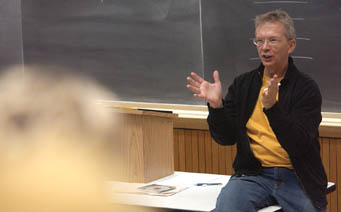

In Class
English to the ‘Max’
Hoping to provide a better introduction to the study of English, professor Morris Eaves set out to create a modern version of ‘English 101.’ By Scott Hauser
 |
| MAXIMIZER: “The pleasure of the class is building in connections to whatever happens to be going on in the department,” Eaves says. |
There’s a decidedly postmodern comfort in walking into a class that’s designed to introduce students to the study of English at Rochester and hearing someone on the sound system sing, “What do you do with a B.A. in English?”
The song from the cast album of the Broadway production of Avenue Q made only one brief, three-minute appearance—and even that was technically before the day’s session got under way—in a semester-long course created by Morris Eaves, professor of English. But the sentiment behind the tongue-in-cheek song is one that those who study English language and literature in college recognize only too well.
Many parents ask the same question, classmates ask it, and, often, students ask it themselves. So wouldn’t it be nice if there were a class that would help students get a better sense of what the study of English is all about—the kind of Intro 101 course that serves as a gateway course in other disciplines?
Maybe call it Maximum English?
“I couldn’t imagine the equivalent of biology 101, because English is too various of a discipline—in a sense, it’s not a single discipline,” says Eaves, the mastermind of (and, at times, the deejay for) Maximum English, officially known as English 101.
Eaves, a former department chair who is a cofounder and coeditor of the William Blake Archive, says he got the idea for the course, in part, because he sensed that English majors often weren’t aware of the different ways they have to pursue their interests at Rochester.
“Many students—even those who have been in the program a long time—often don’t know about the opportunities that are available,” Eaves says. “They usually don’t roam very far from the academic path.”
In the course, students get their first taste of three important topics for English majors: plot, metaphor, and the use of sounds that underlie literature. Or to give things the proper academic gloss—and to give a hint at Eaves’s sense of humor—the topics are known as mythos, metaphor, and melos.
The course requires a heavy dose of reading—both literature and literary criticism—and requires several writing assignments that employ the three topics. For each session, Eaves tries to find contemporary references to that day’s topic using a sound and video system to highlight both whimsical and serious examples in popular culture.
But the organizing principle for the class is exploring how the study of English is exemplified at Rochester. Students are required to attend at least four events, such as poetry readings and theatrical presentations, that occur outside of class and to write about their experiences.
And they get face-to-face introductions to the scholars, teachers, and resident writers and artists who make up the department. In last fall’s edition of the course, Eaves wove in two productions from the department’s International Theatre Program—The Triumph of Love and ’Tis Pity She’s a Whore. Students were required to read the plays, but they also had the chance to talk to the directors and designers of each production.
In addition to Andrew Eggert, visiting director for The Triumph of Love, and English faculty member Nigel Maister, director of ’Tis Pity She’s a Whore, the class heard from Russell Peck, professor of English, who talked to the class twice—once about his work as a Medievalist, and once as director of his study-abroad course, Theatre in London.
Other guests included Sam Nelson, assistant professor of English who directs the University’s Debate Program; Curt Smith, a senior lecturer who directs the internship program for the department; Dmitri Anastasopoulos, an assistant professor who teaches creative writing; Karen Beckman, an assistant professor who specializes in film studies; Jeffrey Tucker, an assistant professor who teaches classes in autobiography; and professors Ken Gross and Rosemary Kegl, who study the literature of the Renaissance. Eaves also invites back former students to talk about their scholarly and career goals.
Greg Hart ’05, a biology and English double major, says the class provides an excellent overview of what people interested in English do with their skills.
“It’s definitely a nice guide to English at Rochester,” Hart says. “Eaves keeps on the pulse of what’s happening now in the department, and he sculpts his class to take advantage of that.”
Eaves says that drawing on the expertise of fellow department members helps students understand what their professors do for a living, but it also helps them get a sense of how they can follow their interests.
Eaves says he deliberately tries to build some spontaneity into the syllabus. For example, he asked poet Sally Keith to stop by before her reading as a guest in the department’s Plutzik series.
“The pleasure of the class is building in connections to whatever happens to be going on in the department,” Eaves says.
English major Diana Davis ’07, who brought homemade chocolate chip cookies to the final session of the semester, says she was impressed by the class’s range.
And, she says, the ideas introduced in the course, especially the discussion of metaphor, have resonated in her other coursework.
“Even in just everyday reading, I can see metaphors that I didn’t see before,” Davis says. “I can talk about stories in ways that I couldn’t before this class.”
